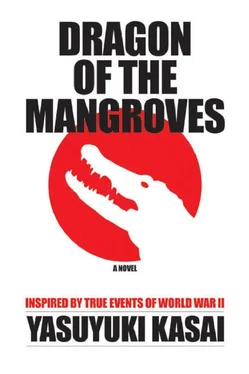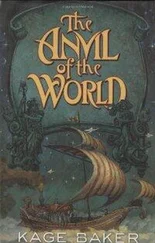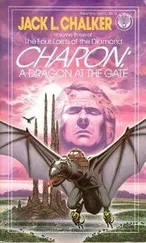A series of sharp metallic sounds of cocking and releasing safety latches was heard in the darkness.
“Here is dangerous. Draw back by ten meters. Get away from the water! But don’t move quickly!” Pondgi said from somewhere behind.
Every soldier began pulling back with his gun at the ready.
What they were up against them now was no human. Any jerky motions might evoke an attack. Everybody moved slowly, like a Noh actor. Sumi was barely able to bear the fear that those white, triangular jaws might break through the darkness and come at him at any moment. He managed to tread on soggy mud before being carried away by the impulse to scream, when a crack of gunfire pealed out from inside the woods on their left. It continued by ones and twos. He could clearly see its muzzle flash in the deep, dark mangrove. It wasn’t further than two hundred meters, or even less.
Pointing in the direction of the gunfire, Morioka said, “It’s the fire of a model thirty-eight infantry rifle, Lieutenant!”
Others also shouted. “Yeah, no doubt! That sound is exactly the same as our rifles.”
“The friendly troop is firing now!”
“We’ve found them at last!”
This firing of rifles awakened their excitement. Yoshitake’s voice was trembling, like he was unable to restrain his emotion. “It’s really worth wading across all the way here. Let’s go and guide them to the south paddy, Lieutenant.”
“Wait! Don’t get flustered. Remember the enemy is around,” Sumi said, holding his rash subordinates with a stifling snap.
The sporadic firing of model thirty-eights didn’t cease, but he didn’t detect even the slightest hint of hostile return fire. If they fired even one shot at the dominating enemy, then there would be the devil to pay. Something was strange.
If they weren’t engaged in a gunfight, what were they shooting at?
Then Sumi heard a weird sound. Mixed with the reports of rifles, a strange shriek, like that of a monkey, came up from the mangrove where they had just witnessed the muzzle fire flashing. But it was obviously different from the monkey jabber they had heard many other times in jungles.
Suddenly every piece of the puzzle linked up in his brain, and he felt like his blood had frozen. He was listening to the screams of men. Then Sumi heard Pondgi mutter quietly, as if he shared the appalling conclusion: “Crocodiles are eating Japanese soldiers.”
8

Superior Private Minoru Kasuga came back to his old foxhole on the morning of February 17, after he and his colleagues had stopped the search for First Lieutenant Kishimoto. He dawdled a whole day there. The HQ staff confirmed the mess kit and the boot as Kishimoto’s equipment. Sergeant Keiichi Tomita apparently had reported his death to the battalion HQ as KIA, as planned. No one mentioned crocodiles after that.
Then an orderly came from the HQ at daybreak of February 18 and notified them that the escape operation would be put in action that midnight, and that everyone should prepare one or two bamboo poles of about two and a half meters length. The instruction ordered each soldier to fill up the hollows of the stem with 2.7 liters of drinking water. They would be forced to swim across Myinkhon Creek by using the bamboo as makeshift buoys. This was ancient enough to remind some of the Warring States period, when armored feudal lords competed for dominance in the sixteenth century. Tomita was infuriated to hear the way-too-primitive plan being called an operation and bawled out the orderly. But once the order had been announced, they had nothing to do but to obey it.
Kasuga had been cutting the bamboo at the foot of Hill 604 when he heard of the death of Second Lieutenant Jinno. A soldier from Machine Gun Company HQ, shifting from Saikpya Village, told him. According to the soldier, Saikpya had suffered an air strike while Tomita Squad had searched for First Lieutenant Kishimoto two days before. The bombing had destroyed all the precious sampan that MG Company HQ had independently maintained to carry the severely injured men. And an automatic cannon had blown off Jinno’s right leg. Jinno must have thought nothing could be done to save him, because reportedly he had entered a nearby mountain alone and killed himself with a grenade.
The soldier told him Jinno’s words to everyone before his death: “I’ve dispatched Sergeant Tomita and his men to Yanthitgyi to study the escape route there. Be sure to pick them up before the creek-crossing operation and take them to the continent. Don’t leave my men in this damned island. Not even one!”
Kasuga was surprised. It was the first and last consideration for his subordinates shown by their platoon commander, whose life until then had been filled with self-protection and deviousness. Kasuga stopped sawing for a while, feeling compassion for his commander. Jinno probably knew his company had lost all the sampan to ferry him. Otherwise, Jinno might have tried to run away to Taungup, even on one leg. The decision to commit suicide couldn’t have been easy.
Kasuga now realized the difficult situation they faced.
Just as Tomita or Jinno had forecasted, the withdrawal seemed to begin from Yanthitgyi. Soldiers were coming from every corner of the island into the surrounding hills, one after another. Unlike Kasuga and others, the soldiers coming there were quite unfamiliar with the geography. When they got a order to bring bamboo, they didn’t know where to find one. Some of them entered the nearby settlements at their own initiative, battered down private houses, and even plundered bamboo poles that were precious building materials for the locals.
This reminded Kasuga of a time he had been slapped by an officer. It was the time their troop had gotten delayed in Rangoon, just after he had come to Burma. He had been out on official duty in a sweltering heat. While he walked on the street teeming with people, he had gotten thirsty and pinched a mango from a passing fruit seller’s cart. Though he had had money, he had thought it bothersome to bargain, for he hadn’t known enough Burmese yet.
As soon as he had taken a bite of it, a fat officer with a saber in his belt, had come out of nowhere and given him a binta, the hard slap, powerful enough to knock him down onto the dusty street. The officer had looked furious; he had apparently seen the whole sequence of events.
He had told Kasuga off, saying, “Listen, you private! You might think it’s only a mango, but what you’re doing now is clear plunder. The Imperial Army is fighting against Britain to liberate Asian people from white men’s colonial rules.
However hard we may try to enforce discipline among front-line troops, if troops like you act this way, how can we set a good example for the locals?”
The sudden confrontation between the two Japanese had attracted a crowd of local spectators. It had been intolerably humiliating for Kasuga to be abused in front of many Burmese, but he had known that the officer was right.
But how about the Imperial Army’s actions of late? They stole rice, stock, and even building materials from locals who were anything but rich. Such actions were opposite their intentions, although they couldn’t help it, being on the verge of death. They might have lost not only the purpose, but the meaning of this war.
Kasuga realized nobody pretended to be brave and impressive anymore, once doomed to defeat. He recalled the face of a soldier, joyful to know of the evacuation order, who had been tearing the bamboo wall apart. Next he tried to remember the face of the fat officer who had foamed at the mouth and admonished him, but the image in his mind was somehow blurred. Though he had surely suffered the burning disgrace, the event seemed long ago.
Читать дальше













